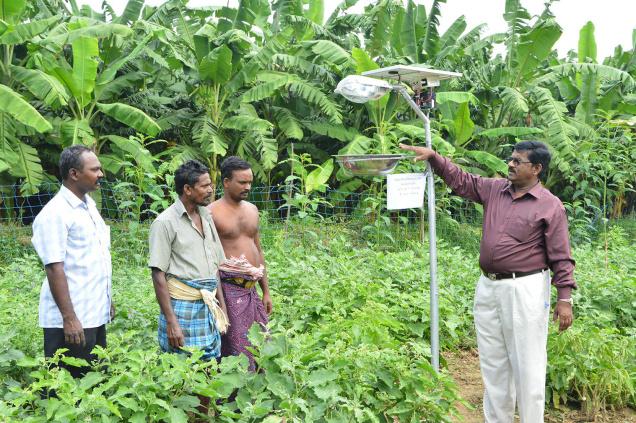
Continuous power supply is essential for any type of agricultural activity. Particularly in villages where the concept of invertors or generators is yet to attain a major breakthrough, electricity disruption means temporary suspension of any activity till power supply resumes.
Though the Government has been harping on need to harness solar power and grants subsidies for installing solar units for farm related activities, the concept is yet to gain momentum.
Major issue
But for some individuals like Mr. David Raja Beula, Assistant Director of Horticulture, Kadayam in Tirunelveli district, Tamil Nadu, electricity disruption does not seem to be a major issue since he has developed several solar powered farming equipment.
Among his recent innovations is the multipurpose solar pest manager and garden light. The device according to him was developed to help brinjal and jasmine cultivators in the region control fruit borer and white fly pest in their crops.
The height of the solar light is about eight feet. It has a solar panel, a battery, two five watt bulbs and an insect collection stainless steel tray on which a sticky paste of castor oil and shampoo mix is smeared.
“Brinjal and jasmine farmers in Kadayam region in the district were struggling to control the fruit borer and white fly pests for a long time. They sprayed pesticides once in seven days to control the problem. During this time I had developed the multipurpose solar pest manager and introduced it to the participants at a meeting. About 35 farmers who attended the meeting were given one device to experiment the efficiency of the device,” says Mr. Beula.
The collection of killed fruit borer moths started at the rate of three moths and gradually increased to 500 moths a day and white flies from 100 numbers to 700 a day.
Reduced spray
“We also found that the frequency of pesticide spray was reduced from once in seven days to once in 15 days and finally once in 30 days, thereby bringing down the expense from Rs.10, 000 to Rs.5,000 for an acre of brinjal and from Rs. 24,000 to Rs. 12,000 for jasmine,” he explains.
Priced at Rs.15,000 a piece, it can be used to control pests in other crops also, according him. Since the device has also a light facility attached, it can be used to light the fields and garden in which it is used.
Farmers repeatedly spray several chemicals, or in case of organic methods use the required bio applications on the jasmine and brinjal crops. But complete eradication seems impossible as the larvae hide in the shoots and fruits and escape the sprays.
“Naturally farmers tend to over-spray thinking that more spraying effectively controls the pest.
Big expense
Repeated spraying causes a big expense for a small farmer. In addition to the financial cost incurred for buying the inputs, excessive application of chemicals creates a negative impact on the environment, in the harvested flowers and vegetables and poses a serious risk to consumers as well,” he says.
Mr. Sivaperumal a small farmer from Therkumadathur village showed thousands of white flies in jasmine crops attracted and killed in the device.
Another farmer from Tharuvai village Mr. Anthony Raj was deeply impressed by the effectiveness of the device in controlling the fruit borer in his brinjal crop and says, “I have got the confidence to expand the cultivation area from half an acre to two acres in the coming season,” he says.
Dhan foundation an NGO in Madurai that works for farmers’ welfare has recorded that the solar multipurpose device helps reduce the boll worm’s infestation in cotton crops by controlling the moths and there was reasonable reduction in pesticide usage among the 35 farmers using it.
Based on order
“At present I do not have a readymade unit available for those who are interested to try it. It is manufactured based on order. So farmers who need it are requested to contact me in advance and place orders,” says Mr. Beula.
For more details and personal visit interested farmers can contact Mr. P. David Raja Beula Assistant Director of Horticulture Kadayam, Tirunelveli District Tamil Nadu,email: microeconomicsdavid@yahoo.co.in, mobile: 09486285704.
source: http://www.thehindu.com / The Hindu / Home> S&T> Science / Farmers Notebook / by M.J. Prabu / January 01st, 2014